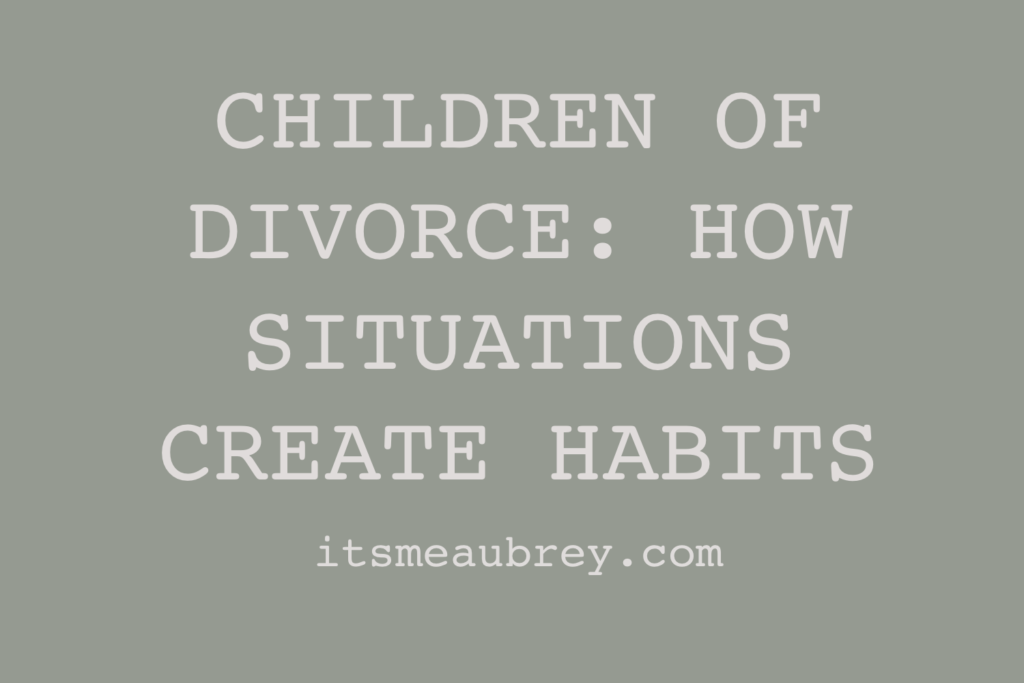From the Education Collection of how divorce affects others
If you would like certain topics to featured in the Collective, send us an email!
I overheard a conversation about a struggling boyfriend-girlfriend relationship, “Do you want to be miserable for 20 years? Do you want your kids to turn out like me? Do you actually love him enough to deal with these red flags?” A friend says for support.
As I tune into their conversation, my mind begins to run as I remind myself of the garbage I went through because I ignored the signs and red flags of my own marriage.
I ponder her question… “do you want your kids to end up like me?” As she continues to talk about how her parent’s divorce shredded her.
If you are a child of divorce, this one’s for you.
Messages Received
“You’re just like your father/mother!”
“Your father/mother is such a terrible person”
“I get sad and lonely when you aren’t here.”
“If it weren’t for you, we wouldn’t be getting a divorce.”
“It’s your father/mother’s fault that our family is broken up”
“We can’t afford to do that because daddy/mommy left.”
Ever heard your parents say one of these before (or something similar)?
Were you blamed for their breakup?
Were you in an enmeshed relationship with your parents; being parentified and taking on the emotional trauma of the divorce or their personal issues?
These messages are only a few that ring in the minds of children. Whether they be young, teenagers, or even adult children, the message is still there.
As a child, (and keep in mind this can range from 0 – 200 years old if you were ever someone’s child) you experienced something difficult.
Your parents separated and you most likely blamed yourself, even if you don’t fully recognize it.
You were made to believe that somehow, you tore your family apart.
Regardless of what you were told, you received a message that has turned into a belief that is now shaping your habits.
How Situations Create Habits:
A habit is formed over time from a series of actions.
Your actions are dictated by emotional responses to beliefs and stories.
These beliefs and stories are created from situations.
Case in point →
“You’re just like your father/mother!” → You began to question the validity of the love from your parents. You started to wonder if you were at risk of losing your parents or being abandoned since you watched your them split. This fear of abandonment potentially creates an attachment style within you that causes you to be codependent in others and afraid of loss and/or causes you to work effortlessly to prove you are anything but your mother/father.
“Your father/mother is such a terrible person” → You heard your parents talk poorly about each other. The criticism potentially left you feeling equally criticized especially if you looked up to that parent for any reason. Feelings of guilt and shame then arise for seeing that parent as a hero. This creates distrust within yourself; not being able to trust that you know someone properly or even yourself.
“I get sad and lonely when you aren’t here.” → You took on the role of emotional supporter so your parents could cope. Children are not there to fill the needs of a parent, especially emotional reliance. Enmeshment is an unhealthy attachment style where the parent’s boundaries with the child simply don’t exist. When a child is being parentified and told to step in to fulfill any of the needs of the parent, the child receives the message loud and clear that being independent is wrong. Perhaps you started to feel that you were responsible for their happiness. This can result in you developing people-pleasing habits just to satisfy your parents, and then neglecting your own needs.
“If it weren’t for you, we wouldn’t be getting a divorce.”–> You already blamed yourself for their separation, and this confirms all of the fears you already felt about the divorce. As a child, you didn’t possess the tools to cope with the stress following the separation of your parents. Holding onto this blame can result in feelings of low self-worth, disappointment in your character, and can leave you feeling like you are never enough.
“It’s your father/mother’s fault that our family is broken up” → You were put in the impossible space of needing to “choose” a side/parent. This left you feeling conflicted and untrustworthy of one or both of your parents. This potentially caused you to feel afraid to open up about your emotions in fear that they weren’t/aren’t safe to share with “untrustworthy” people.
“We can’t afford to do that because daddy/mommy left.” → Since you blame yourself for the divorce, now you are taking on the burden of their finances as well. This responsibility parentified you and made you take a responsibility that wasn’t yours to take. This can lead to issues surrounding money and control.
Beliefs Can Be Changed
Children watch and mimic what adults do. They repeat habits and patterns. They take inventory of behaviors and reactions to situations. You did that, I did that, and your next door neighbor did that too.
So you’re not alone in learning behaviors from the situations you were put in.
But the beautiful thing is that you can change your beliefs.
What you experienced was not your fault.
You didn’t deserve what happened to you.
Healing begins by recognizing where your responsibility lies.
Release the responsibility that your parent’s divorce was on you.
I have an entire 1:1 program designed for Children of Divorce to help release the shame and guilt surrounding that painful event. If you want to know more, set up a free 15-minute call to see if this can help you.
Xoxo, Aubs

